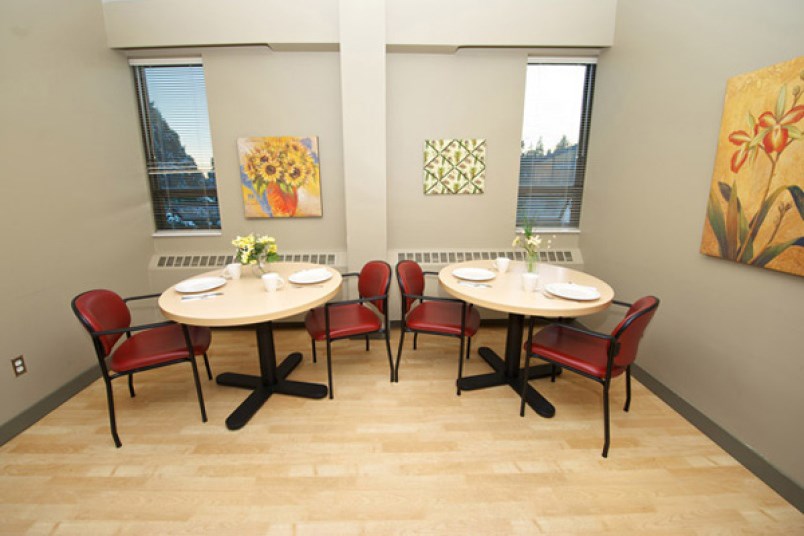Eagle Ridge Hospital is transforming its service delivery model to meet the needs of a growing seniors population resulting in more programs and staff who are knowledgable in providing care to the region’s elderly, according to the hospital’s executive director.
The change, which began over a year ago with the relocation of 19 acute-care-for-the-elderly beds from Royal Columbian Hospital to ERH and the hiring of two geriatric physicians, continues next month.
That’s when a 26-bed Patient Assessment and Transition to Home (PATH) unit moves from New Westminster to Port Moody, doubling beds at ERH for seniors recovering from an acute illness who need help with life skills, such as cooking, personal hygiene and dressing, to get back on their feet, and a respite care program is also moving from the Queens Park Care Centre to Port Moody.
The new Respite Hotel will be located at Eagle Ridge Manor, and will provide hotel-like amenities for residents, while their caregivers get short-term relief to attend to their own medical needs or other issues.
In an interview last week, Lisa Zetes-Zanatta confirmed the moves and said it’s part of a long-term plan to ensure the area's elderly, who make up the bulk of hospital patients, get the right care and are supported to move back into the community if they can.
“Our focus is on the geriatric population and we will do everything we can to really promote it so our community feels comfortable with utilizing our services,” Zetes-Zanatta said.
Changing demographics are behind the transition, she added, noting that the Tri-Cities’ seniors population is expected to grow rapidly by 2025, and in that short time the hospital needs to adjust its services as many other communities have already done.
Staff education and training are key to the transition as well, said Zetes-Zanatta, as the elderly population has special needs. For example, staff are learning how to identify delirium in seniors who have had surgery or other health issues, such as infection, so it can be treated more quickly.
“The overall goal of these changes are consistent with what our communities’ needs are,” Zetes-Zanatta further stated.
But the transition doesn’t come without some big changes at the hospital. While ERH will still provide care to younger populations — and indeed an Emergency Room expansion is expected to help deal with that — the high intensity rehabilitation unit located at ERH is moving to Queens Park Care Centre.
This program, which has a lengthy history at Eagle Ridge, helps people recover from serious injury such as a stroke, brain injury or amputation and the multi-disciplinary team including a physiotherapist, occupational therapist and a speech language pathologist are expected to move to the New Westminster location, although they will have other options, and no jobs will be lost, Zetes-Zanatta said.
This service, which is for people who can’t live independently and need specialized treatment, will join the Yale Road Centre Acquired Brain Injury Unit at Queens Park to form the Fraser North Rehabilitation Centre of Excellence.
However, the outpatient rehabilitation clinic, which serves stroke victims and other patients who live in the Tri-Cities and Maple Ridge, will remain at Eagle Ridge.
“That’s the piece we did need to make sure it remains local because we didn’t want to inconvenience community members by asking them to travel that far,” Zetes-Zanatta said.
Still, the transition means big changes for staff who will have to decide in the next few weeks whether to take a posting in the new location. For example, the PATH program, where people stay for a short term while they are assessed and helped to regain their mobility and life skills after an acute illness or surgery, needs care aids while the rehab program moving to Queens Park in New Westminster requires nursing and other specialized staff.
Zetes-Zanatta acknowledged that the movement of staff will take time, and some people may take other jobs, while the union said it is working with Fraser Health to ensure the transition is smooth and workers’ concerns are addressed.
“HSA is aware of the proposed program changes at a number of facilities in Fraser Health including at Eagle Ridge Hospital. We are currently working with our members and Fraser Health to ensure our members are supported and that patient care is not impacted during these changes. We cannot discuss the details of any of these changes as we are reviewing the proposals and are currently in discussions with Fraser Health,” stated Health Sciences Association president Val Avery in an email to The Tri-City News.
Once the units have made the move, a process that will take place mid-September, Zetes-Zanatta believes they will be the last big relocations to take place, and with few renovations needed at ERH, should go smoothly.
But despite the change, she said the community will eventually benefit because the seniors population needing care will increasingly be a focus of B.C.’s medical system.
“We’ve always had the population of our older adults and geriatric at the site. What we’re trying to do is really focus the activities and the medical staff and the nursing staff to be relevant to the population that we already had and we’re building on that to meet the needs of the growing seniors population.”



